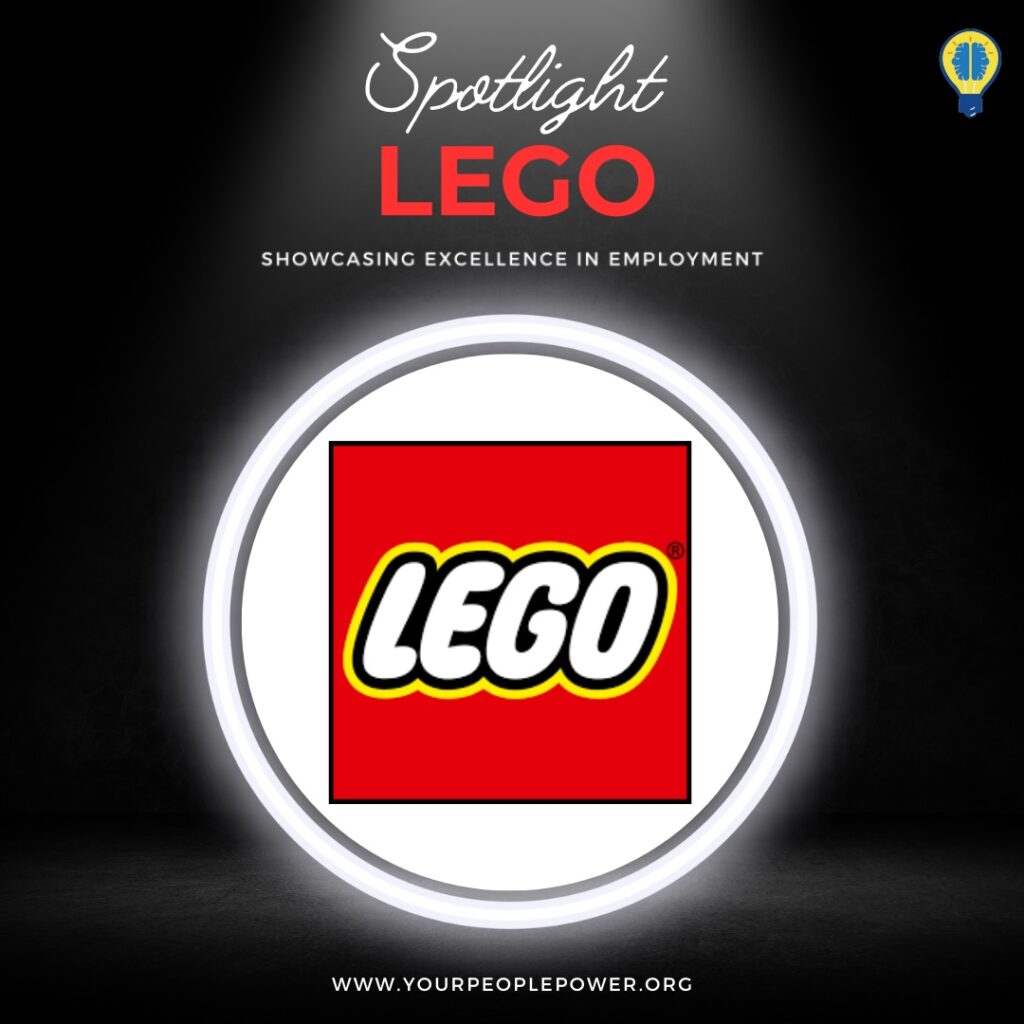LEGO Building Belonging through Creativity and Play:🌍 YPP Spotlight
5 August 2025
ginabuckney
Culture, Employee Engagement, Inclusion, Spotlight, Uncategorised, World Leading Organisations

How LEGO Uses Creativity and Play to Strengthen Workplace Culture
When most people think of LEGO, they picture colourful bricks and boundless imagination. But inside the LEGO Group’s offices, the same principles of creativity, curiosity, and connection are used to build something equally powerful: an inclusive, joyful workplace culture where people feel a true sense of belonging.
As the world marks International Friendship Day, LEGO’s approach offers a masterclass in how play, purpose, and people-first thinking can transform a company into more than just a workplace, it becomes a community.
A Culture Designed for Connection
At LEGO, connection isn’t left to chance, it’s designed into the very fabric of the employee experience. Their headquarters in Billund, Denmark, features open spaces, co-creation zones, and areas where teams can physically build prototypes together. The environment encourages spontaneous conversations and cross-department collaboration, much like children playing together on the floor with a shared set of bricks.
Even in hybrid and remote settings, LEGO has been intentional about keeping that spirit alive. Regular “build breaks” invite employees to step away from their laptops, open a small LEGO set sent to their home, and join a virtual build-along session with colleagues from around the world. These moments spark laughter, creativity, and camaraderie, a welcome antidote to video call fatigue.
The Science of Play at Work
Research shows that play isn’t just fun; it’s a proven tool for boosting creativity, problem-solving, and resilience. LEGO embraces this wholeheartedly. Workshops often begin with hands-on building exercises, using LEGO bricks to unlock innovative thinking and encourage different perspectives.
This play-based approach breaks down hierarchy, a senior leader’s spaceship is just as vulnerable to collapsing as a graduate trainee’s tower, and creates a psychologically safe space where ideas can flow without fear of judgment.
Friendship and Wellbeing Go Hand in Hand
Friendship in the workplace isn’t a nice-to-have; it’s a driver of engagement and wellbeing. Gallup research shows that employees with a best friend at work are more likely to be happy, engaged, and productive. LEGO has taken this insight to heart, encouraging relationships that go beyond project deadlines.
Their Employee Resource Groups (ERGs) and interest clubs, ranging from cycling and photography to gaming and parenting, provide colleagues with common ground to connect. Global celebration days, family days, and volunteering events help strengthen bonds across cultures and geographies.
The company also invests heavily in mental health and wellbeing support, recognising that friendships flourish when people feel safe and supported. Access to counselling, flexible work policies, and wellbeing leave are part of a holistic package designed to care for employees as whole people.
Inclusion: Building for Everyone
LEGO’s tagline, “Only the best is good enough,” applies not only to its products but to its culture. The company’s diversity, equity, and inclusion (DEI) strategy goes beyond representation, it’s about creating a place where everyone feels they can bring their authentic self to work.
This includes inclusive product design (such as LEGO sets representing different cultures, abilities, and family structures) and internal inclusion training for leaders and teams. Representation matters, but so does ensuring that every voice is heard in meetings, brainstorming sessions, and decision-making processes.
From Bricks to Bonds: Lessons for Other Organisations
LEGO’s success offers valuable takeaways for any organisation seeking to foster connection:
- Design for interaction, not isolation – Physical and virtual spaces should encourage people to engage with each other naturally.
- Use play to unlock creativity – Play isn’t childish; it’s a powerful tool for problem-solving and collaboration.
- Prioritise psychological safety – True friendships grow where people feel safe, respected, and supported.
- Encourage shared experiences – From volunteering to virtual games, shared activities strengthen bonds across teams.
- Embed inclusion into culture and products – Representation and respect create a sense of belonging for all.
Why It Works
By embedding creativity and play into their workplace culture, LEGO has built an environment where connection isn’t forced; it flourishes. People aren’t just colleagues; they’re collaborators, co-creators, and often, friends.
This sense of belonging doesn’t just make work more enjoyable; it drives performance, retention, and innovation. Employees who feel connected are more willing to take creative risks, share ideas, and go the extra mile, all of which feed back into the company’s success.
In an era when workplace loneliness is on the rise, LEGO’s approach is both timely and timeless. It’s a reminder that when we build with connection in mind, whether with bricks, ideas, or relationships, we create something far stronger than the sum of its parts.
About Your People Power:
Your People Power is a workplace performance and wellbeing consultancy founded by Gina Buckney. We spotlight the organisations getting workplace culture right, inspiring leaders to create happier, healthier, and higher-performing teams.
✨ Want your organisation featured next?
If your company is leading the way in culture, performance, or workplace wellbeing, we’d love to hear from you.
If your company is leading the way in culture, performance, or workplace wellbeing, we’d love to hear from you.
📩 Contact our press team: press@yourpeoplepower.org
👉 Enjoyed this feature on LEGO?
You might also like last week’s Spotlight on Amazon.
You might also like last week’s Spotlight on Amazon.
Recent Posts
- UN Women UK Selects Gina Buckney for CSW70 on Women in Tech 25 February 2026
- International Women’s Day 2026 Theme: Give to Gain 5 February 2026
- Career Survival in the Age of AI 29 January 2026
- Oracle’s $70bn Stock Shock: What It Means for AI Investment and Transformational Leadership 11 December 2025
- HSBC x Mistral AI: What This Strategic Partnership Signals for the Future of Banking and Enterprise AI 1 December 2025